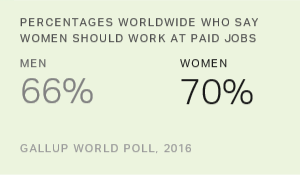More than one in five employed people worldwide -- 23% -- have experienced one or more forms of violence or harassment at work in their lives, according to a new global study.
The ILO-Lloyd’s Register Foundation-Gallup survey provides the first-ever global assessment of such experiences, asking more than 74,000 workers in 121 countries and territories about three forms of violence or harassment: physical, psychological and sexual.
In addition to measuring the incidence of each type of violence or harassment, the study provides vital information on who is most likely to experience it. Given that workplace violence and harassment frequently go unreported, the survey also asked self-reported victims of this abuse whether they had reported their experiences and about the reasons they may not have done so.
Key Findings
Workplace violence and harassment are widespread phenomena around the world.
The 23% of employed adults who said they had experienced at least one form of violence and harassment translates to nearly 750 million workers worldwide. Those who had experienced each of the three main forms of violence and harassment also number in the hundreds of millions:
- Psychological violence and harassment -- including insults, threats, bullying or intimidation -- was the most commonly reported form among men and women. Globally, 18% of employed people, representing almost 590 million workers, said they had experienced it in their working lives.
- Almost one in 10 workers worldwide (9% or nearly 280 million) said they had experienced physical violence and harassment, such as hitting, restraining or spitting.
- Women were more likely than men to report experiencing sexual violence and harassment, such as unwanted sexual touching, comments, pictures, emails or requests. Overall, 6% of employed people (more than 200 million) had experienced sexual violence and harassment, including 8% of women and 5% of men.
The study also found that for most people who have faced workplace violence and harassment, it was not an isolated incident: At the global level, 61% of self-reported victims said they had experienced it three or more times during their working lives.
What’s more, many people who experience one form of workplace violence and harassment may also be vulnerable to others. Among those who had experienced any of the three forms in their lifetimes, almost one-third (32%) said they had faced more than one form, and 6% had experienced all three.
Certain demographic groups -- including young women -- are particularly at risk for experiencing workplace violence and harassment.
Overall, 18% of employed people said they had experienced some form of violence and harassment in the past five years, but this figure rises to 23% of workers aged 15 to 24. Young women are particularly vulnerable to sexual violence and harassment: 9% said they had faced it in the past five years, compared with 4% of young men.
Almost half of workplace violence and harassment victims had never told anyone about their experience.
Among those who have faced violence and harassment in their working lives, 54% worldwide said they had told someone about the experience, with women more likely than men to have done so (61% versus 50%, respectively).
The gender gap is related to the finding that people who had experienced only sexual violence and harassment (which is more common among women) were more likely to have reported it than those who had experienced only physical violence and harassment (which is somewhat more common among men) -- 62% versus 38%, respectively.
Among those who said they had not shared their experiences of workplace violence and harassment, the most commonly selected reason for not doing so -- cited by 55% -- was that they believed telling someone about it would have been a waste of time. However, at least one-third cited each of the seven reasons tested, with many saying they feared for their reputation (45%) or that reporting procedures at work were unclear (43%).
Workplace violence and harassment cause untold harm to individuals’ wellbeing and undermine the productivity of businesses and organizations around the world. The results from this groundbreaking study shed new light on the incidence of different forms of violence and harassment at the global and regional levels, and highlight the importance of the ILO’s 2019 Violence and Harassment Convention, C190, which calls for participating nations to “respect, promote and realize the right of everyone to a world of work free from violence and harassment.”
The high percentage of self-reported victims who say they never reported their experiences with violence and harassment, as well as their most common reasons for not doing so, also underscore C190’s call to establish strong legal prohibitions and workplace policies to combat violence and harassment, ensure access to support for victims, and raise awareness about the issue through education and training. This research can help inform strategies for achieving these goals and upholding workers’ right to a healthy and safe working environment.
Read the full report: Experiences of violence and harassment at work: A global first survey.
To stay up to date with the latest Gallup News insights and updates, follow us on Twitter.
For complete methodology and specific survey dates, please review Gallup's Country Data Set details.




